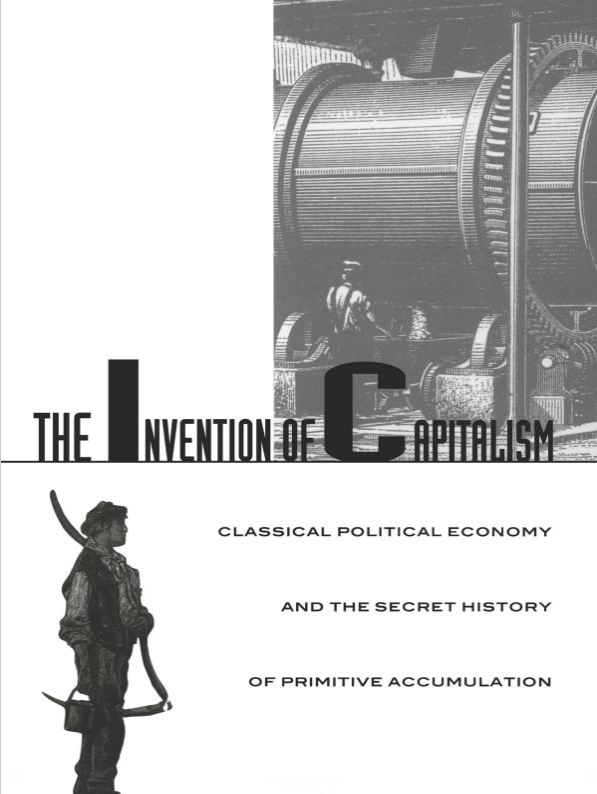Warning: Undefined array key "ssba_bar_buttons" in /usr/home/movgwifi/public_html/yesedinburghwest.info/wp-content/plugins/simple-share-buttons-adder/php/class-buttons.php on line 602
Warning: Undefined array key "ssba_bar_buttons" in /usr/home/movgwifi/public_html/yesedinburghwest.info/wp-content/plugins/simple-share-buttons-adder/php/class-buttons.php on line 602
Warning: Undefined array key "ssba_bar_buttons" in /usr/home/movgwifi/public_html/yesedinburghwest.info/wp-content/plugins/simple-share-buttons-adder/php/class-buttons.php on line 602

Reviewed by Films for Action. Read in PDF form.
Popular economic wisdom says that capitalism equals freedom and free societies. The Invention of Capitalism, by an economic historian named Michael Perelmen, challenges this.
The historical record makes clear that Adam Smith and his laissez-faire buddies were closet-case statists, who needed brutal government policies to whip the peasantry into a good capitalistic workforce willing to accept wage slavery. Francis Hutcheson, from whom Adam Smith learned all about the virtue of natural liberty, wrote: ”it is the one great design of civil laws to strengthen by political sanctions the several laws of nature. … The populace needs to be taught, and engaged by laws, into the best methods of managing their own affairs and exercising mechanic art.”
Peasants didn’t want to give up their rural communal lifestyle, leave their land and go work for below-subsistence wages in shitty, dangerous factories being set up by a new, rich class of landowning capitalists. Using Adam Smith’s own estimates of factory wages being paid at the time in Scotland, a factory-peasant would have to toil for more than three days to buy a pair of commercially produced shoes. Or they could make their own traditional brogues using their own leather in a matter of hours. But in order for capitalism to work, capitalists needed a pool of cheap, surplus labour. So what to do? Destroy their traditional means of self-support and enact a series of laws and measures designed to push peasants out of the old and into the new.
“The brutal acts associated with the process of stripping the majority of the people of the means of producing for themselves might seem far removed from the laissez-faire reputation of classical political economy.” “In reality, the dispossession of the majority of small-scale producers and the construction of laissez-faire are closely connected, so much so that Marx, or his translators, labelled this expropriation of the masses as ‘‘primitive accumulation.’’
Peasants were forced off the land – from the enactment of so-called Game Laws that prohibited peasants from hunting, to the destruction of the peasant productivity by fencing the commons into smaller lots – Adam Smith’s proto-capitalist colleagues complained about how peasants are too independent and comfortable to be properly exploited, and trying to figure out how to force them to accept a life of wage slavery.
John Bellers, a Quaker “philanthropist” and economic thinker saw independent peasants as a hindrance to his plan of forcing poor people into prison-factories, where they would live, work and produce a profit of 45% for aristocratic owners:
Daniel Defoe, the novelist and trader, noted that in the Scottish Highlands “people were extremely well furnished with provisions. … venison exceedingly plentiful, and at all seasons, young or old, which they kill with their guns whenever they find it.’’
Arthur Young, an economic thinker respected by John Stuart Mill, wrote in 1771: “everyone but an idiot knows that the lower classes must be kept poor, or they will never be industrious.”
Sir William Temple advocated putting 4-year-old kids to work in the factories – some thought that 4 was already too old.
Even David Hume, that great humanist, hailed poverty and hunger as positive experiences for the lower classes, and even blamed the “poverty” of France on its good weather and fertile soil.
Patrick Colquhoun’s summary: “Poverty is therefore a most necessary and indispensable ingredient in society…It is the source of wealth, since without poverty, there could be no labour; there could be no riches, no refinement, no comfort, and no benefit to those who may be possessed of wealth.”
Yes Edinburgh West has a website, Facebook, Twitter, National Yes Registry and a Library of topics on Scottish Politics, including Social Justice.



